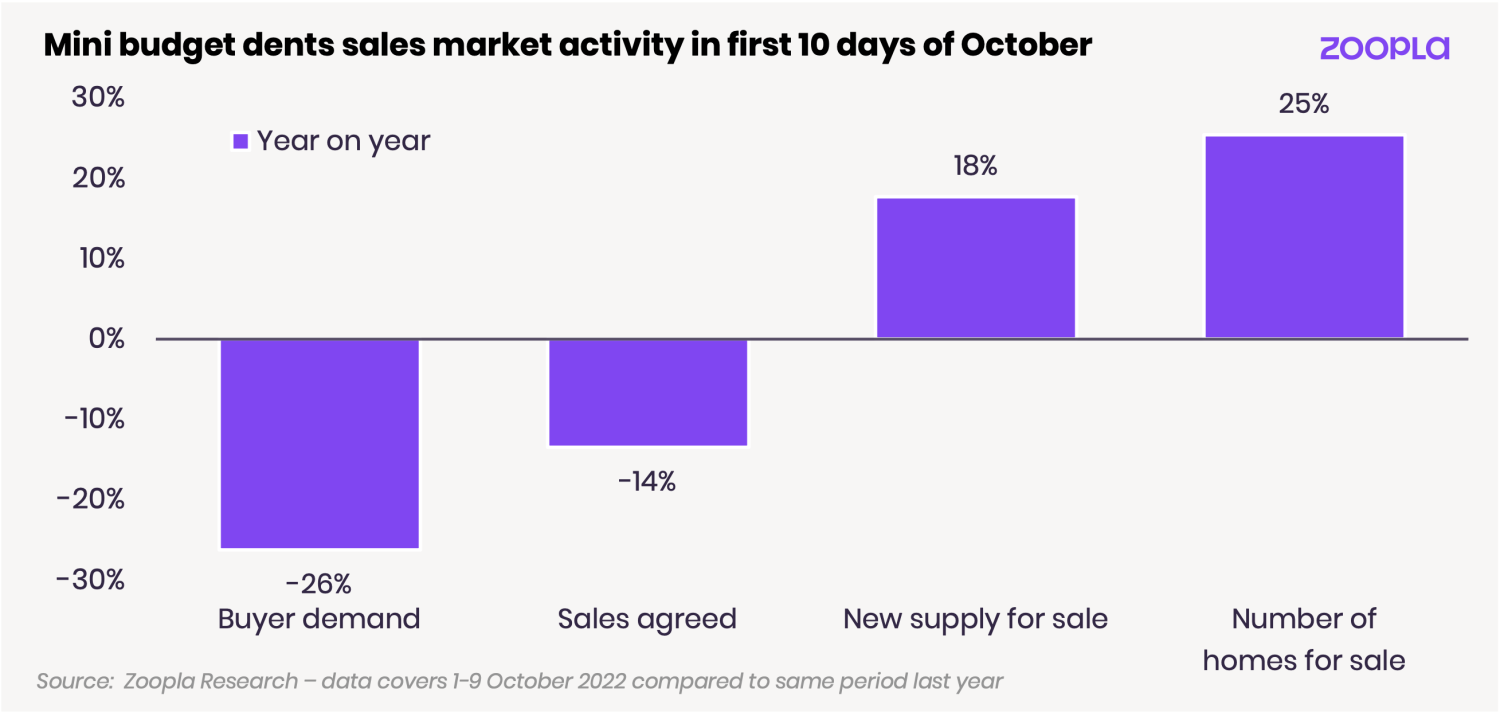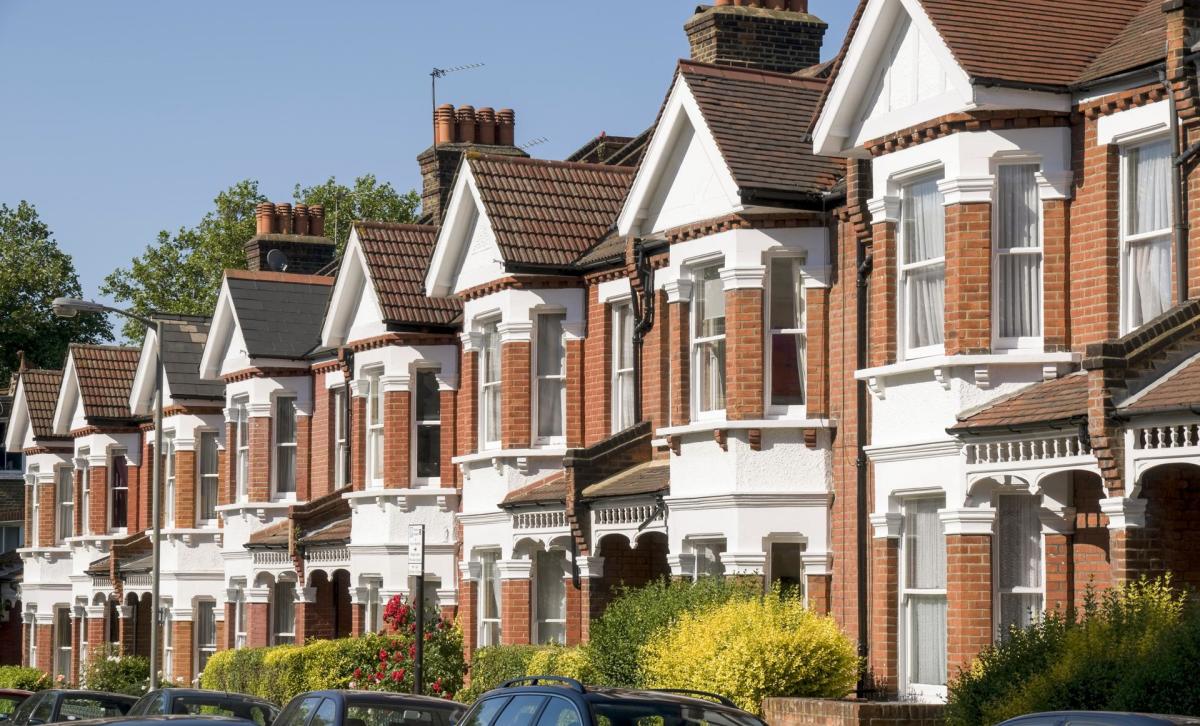Housing market slows but prices hold steady, says RICS
Activity levels in the market have fallen, but a shortage of homes for sale is supporting house prices.
Activity in the housing market is slowing down in the face of rising interest rates and economic uncertainty.
The number of people looking to buy a home fell for the fifth month in a row during September, according to the Royal Institution of Chartered Surveyors.
There was also a further fall in the both the number of homes put on the market and the number of sales agreed.
But the ongoing shortage of properties for sale continued to support prices, with estate agents having a record low of just 34 homes on their books on average.
Although estate agents reported a slowdown in the rate at which house prices are increasing, they are not currently seeing price falls.
This mismatch between supply and demand is expected to continue to support property values in the year ahead, with estate agents predicting ‘a slight dip in prices’ in the next 12 months.
Why is this happening?
A combination of rising mortgage rates and the cost-of-living squeeze is making people more cautious about making a big financial purchase, such as buying a house.
The situation has been exacerbated by the economic uncertainty created by the mini-Budget and talk that the UK is heading for a recession.
But at the same time, the ongoing shortage of homes for sale has continued, meaning there are still more potential buyers than there are properties on the market.
This situation is helping to prevent widespread price falls, despite rising mortgage rates.
Simon Rubinsohn, RICS Chief Economist, said: “The turmoil in mortgage markets in recent weeks has compounded the increasing level of economic uncertainty resulting from higher energy bills and the wider cost of living crisis, in shifting the dial in the housing market.
“Looking further out, the picture portrayed by the RICS survey has clearly shifted in a negative direction.”
Who does it affect?
Estate agents reported a deterioration in housing market activity across all regions of the UK.
The RICS data adds to House Price Index which suggests the market is pivoting from being a sellers’ market to a buyers’ one.
If you are considering buying a new home, the slowdown in activity may enable you to negotiate an offer below the property’s listing price.
You are also not likely to face the same level of intense competition from other buyers as you would have done earlier in the year.
But with mortgage rates rising, it is important to do your sums to make sure you will continue to be able to afford your mortgage repayments as interest rates continue to rise.
If you are selling a home, you may not be able to achieve such a high price for it as you would have been able to over the summer.
But despite the drop in buyer numbers, there are still people looking to move, and the shortage of homes on the market means you should be able to achieve a sale.
What’s the background?
The RICS survey pointing to a slight dip in prices contrasts with predictions from some commentators that the market is facing widespread price falls.
Richard Donnell, director of research and insight at Zoopla, is not expecting house prices to fall this year.
Going into 2023, he points out that there are both positives and negatives that will impact the market.
“The importance of the home to households remains and pandemic and cost-of-living pressures will continue to stimulate home moves, probably from an older cohort of sellers.
“Who will buy these homes and what they can afford will dictate the outturn for 2023. Some form of price correction is likely but the scale is far from clear and will vary by region and property type.”
Key takeaways
- The number of people looking to buy a home fell for the fifth month in a row during September
- There was also a further fall in the number of homes put on the market and the number of sales agrees
- But prices held firm due to the shortage of properties for sale
Rise in over-40s taking out 35-year mortgages
The number of over-40s taking out 35-year mortgages has risen by nearly 40% this year. Higher house prices and the cost-of-living squeeze is thought to be driving the trend.
The number of people aged over 40 taking out mortgages with a term of 35 years or more has increased sharply.
More than 3,000 over 40s are predicted to take out the long-term mortgages by the end of this year, showing a 39% increase compared to last year, and a 433% increase compared to 2020..
In the first two months of this year, a total of 478 people in the over-40s age group took out a home loan with a term of at least 35 years, according to Financial Conduct Authority data acquired by Quilter.
Karen Noye, mortgage expert at Quilter, said: “Since the pandemic, we have seen a steady increase in the number of over 40s taking out mortgages with longer terms.
"And while this is not inherently wrong, it does have the potential to stretch people’s finances later in life.
“While the sales remain in the hundreds for now, the spike is concerning nonetheless.
"For those people considering entering into a mortgage that will see them well into retirement, it is vital they think ahead and are aware of the potential risks.”
Why is this happening?
There has been a steady increase in people taking out mortgages with terms of 35 years or more in recent years.
But the rise has previously been driven by younger people, particularly first-time buyers, who typically opt for a longer mortgage term to help keep their monthly mortgage repayments affordable.
The rise in older homeowners choosing a longer term is thought to have been driven by the combination of high house prices and the cost-of-living squeeze.
What are the pros and cons of a longer mortgage term?
The main advantage of a longer mortgage term is that it keeps monthly mortgage repayments lower.
For example, if you have a £250,000 with an interest rate of 5% and a 25-year mortgage term, your monthly repayments would be around £1,460.
If you increase the term to 35 years, your monthly repayments would fall to £1,260.
But there is a downside to repaying your mortgage over a longer period, as it means you will pay more in interest over the lifetime of the loan.
In the example above, you would pay a total of £188,443 in interest if you repaid your mortgage over 25 years, but the figure would soar to £279,922 if you repaid it over 35 years.
Why should older borrowers be cautious?
While many homeowners may be happy to pay more interest in the long run if it enables them to afford to buy the property they want, older borrowers should think carefully before taking out a 35-year mortgage term.
This is because the mortgage term will continue after they have retired. For example, if someone aged 41 who takes out a 35-year mortgage will be 76 by the time they repay it.
As a result, they need to make sure they can continue to afford their mortgage repayments once they have stopped working and that doing so will not negatively impact their standard of living.
People aged over 40 thinking of taking out a mortgage with a 35-year term should consider taking financial advice to ensure they can still afford it during retirement.
They could also opt to make overpayments before they retire, to help them payoff their mortgage sooner.
Key takeaways
- The number of people aged over 40 taking out mortgages with a term of 35 years or more has sharply increased
- The trend is being driven by high property values and increases to the cost of living
- The longer term means over-40s will not only pay more interest over the life of their loan, but will still be repaying off their mortgage during retirement
What has happened to the housing market since the mini budget?
How have home buyers reacted since the mini budget? And what should those who are moving - or considering a move - do now?
It’s been a frantic two weeks for the housing and mortgage markets.
Any active home mover or household looking to buy will have read the headlines around mortgage availability and pricing with a growing degree of consternation.
We have seen a drop in activity levels in the sales market, not precipitous, but a definite reaction from home buyers to increasing uncertainty and the disruption in the mortgage market.
The outlook for 2023 all depends on how quickly inflation is brought under control and financial markets getting more clarity on how the government will fund the recent tax cuts.
The longer mortgage rates stay at 6% or higher, the greater the impact on the housing market.
Sales market activity drops in wake of mini budget

Mortgage rates were set to rise to 4-5% over 2022 before the mini budget.
This, together with increases in the the cost of living, were starting to weaken demand for homes over the summer months.
The fall-out from the mini budget has effectively added an extra 1% to mortgage rates, which are now settling around the 6% mark.
This increase represents a 25-30% hit to the buying power of home buyers using a mortgage.
Rising mortgage rates set to reduce buying power by 28%
Widespread reporting of mortgages being pulled and the increase costs of mortgage payments have certainly dented market activity.
Buyer demand starts to fall
Buyer demand - enquiries about homes for sale on Zoopla - have dropped by over a fifth in the last two weeks.
Homeowners are continuing to express an interest in buying homes but increased uncertainty is putting some people off.
Demand for homes is now at the weakest level since the pandemic started, although still above 2019 levels.
The reduction in demand has been broadly uniform across all regions and countries of the United Kingdom, with Scotland holding up the best.
The number of new sales agreed has also dropped by 15% over the last week.
Buyers who have not locked in cheap mortgage deals, or those who are worried over the outlook are stepping back from the market.
However, those with cheap mortgage rates locked in below 4% will continue to seek out homes to buy.
The risk is that a growing chorus of predictions of national price falls will see more people stop actively looking for homes for the rest of this year, reducing demand and new sales.
Asking prices were being adjusted down over the summer in the face of higher borrowing costs and weaker demand.
The last two weeks have seen a spike in asking price reductions on homes for sale.
This is a seasonal trend as we start the autumn selling market, but nearly 8% of homes for sale registered a reduction in the asking price of more than 5% in the last month.
Will house prices fall this year, given the hit to demand?
This is unlikely. However, there is a likelihood that surveyors will start to down-value in the face of greater uncertainty and reports of deals falling through.
Some sellers may accept price reductions in order to get sales through to completion, which may be passed along buying chains and risk the chain progressing.
Those would-be sellers who need a certain sale price to unlock their next move will likely step back from the market in the short term and reconsider their position in early 2023.
We will need to see large downward moves in asking prices across the market before national measures of completed house price sales start to record price falls.
Measures of asking prices or valuations may move sooner.
The reality is that the rest of 2022 will be about closing out the pipeline of sales and minimising fall-throughs, rather than seeing a lot of homes come to the market for sale.
We will get a much clearer picture of pricing for new business from January 2023.
Will homeowners start experiencing negative equity?
There is a huge equity cushion to absorb any price falls. Home prices have jumped over the pandemic, with the cost of houses in Wales increasing by 27% over the last two years.
A nationwide 15% reduction in house prices from today’s levels would result in very few cases of negative equity for mortgaged sales up to the end of 2021.
This highlights how the housing market has become increasingly equity driven and is much less dependent on high loan to value (LTV) borrowing over 90%.
Winter 2022 will see a pause in activity as buyers look to refinance
The final three months of the year is not traditionally a strong period for new buyer activity in the sales market, accounting for less than a fifth of new buyer demand over the typical year.
We still expect continued demand from a smaller group of buyers who are committed to proceed.
Recent data from the Bank of England showed a surprising 17% increase in mortgage approvals in August as buyers looked to lock in deals ahead of higher mortgage rates.
Sellers and buyers need to be flexible and realistic given the shifting economic backdrop.
Estate agents and mortgage brokers will help those in the middle of home purchases to complete sales, minimising the fallout from fall-throughs and collapsing chains.
It's not an easy task. But for committed movers with cheap mortgages, the desire to push ahead is likely to remain.
How can I keep my mortgage repayments down?
Banks are seeing strong demand from consumers on refinancing options in the face of £200-£500 monthly increases in mortgage repayments for a typical mortgage taken out 2 years ago.
The scale of this repayment shock can be reduced if borrowers and their lenders agree to extend the term of the mortgage a number of years.
This delivers a short term relief from higher repayments but at the cost of much bigger interest payments over the life of the loan.
That may not be an option for some with long mortgage terms, where extending may breach the age limits beyond which a mortgage can run. However, it will be one of many strategies banks and their customers consider and should keep arrears levels in check.
Keep watching the market and seeking advice
The outlook remains a balance of positives and negatives.
The importance of the home to households remains and pandemic and cost-of-living pressures will continue to stimulate home moves, probably from an older cohort of sellers.
Who will buy these homes and what they can afford will dictate the outturn for 2023. Some form of price correction is likely but the scale is far from clear and will vary by region and property type.
Buying a home is a long process lasting up to 9 or 12 months.
Existing homeowners wanting to move need to keep tracking their local market, the value of their home and considering the options for their next move.
It is a more challenging outlook for first-time buyers, who either live at home or rent before buying.
The cost of renting is rising fast, adding to affordability pressures, especially in southern England where prices are highest.
Many would-be buyers tend to focus on certain areas they know or have wanted to live in for years.
With higher mortgage rates hitting buying power, the key is looking more widely and considering other areas that might offer better value for money.
More working from home has opened up the options to look further afield.
Speaking to agents where you live today - and might want to move to tomorrow - early in the process is ever more important as households consider their next move.
Key takeaways
-
Demand for homes has fallen by a fifth since the mini budget
-
Homebuyers with cheap loans remain in the market and still want to complete on sales
-
The industry is focused on converting sales agreed into completions and minimising fall-throughs
-
To achieve a sale, sellers need to be realistic when pricing their homes
First-time buyers delay home purchase plans by two years
Those who do go ahead with a purchase are opting for longer mortgage terms due to the cost-of-living squeeze.
First-time buyers are delaying plans to purchase a home by nearly two years in the face of the cost-of-living squeeze.
Nearly three-quarters of people trying to get on to the property ladder say their goal has been impacted by rising prices, according to research by mortgage lender Aldermore.
A third of prospective first-time buyers have put their plans on hold, expecting an average delay of 20 months, while 19% are now looking to buy a cheaper home, and 64% have had to scale back the amount they save each month.
Those who do go ahead with a purchase are opting for longer mortgage terms to help make their monthly mortgage repayments more affordable.
A record 38% of first-time buyers and home movers opted for a mortgage term of 30 years or more in June, figures from trade body UK Finance showed.
Why is this happening?
Inflation, which measures the rate at which the cost of goods and services increases, is currently running at a 40-year high.
The situation impacts first-time buyers in two ways.
On the one hand, higher prices mean first-time buyers have less money to set aside towards a deposit after they have met their essential outgoings.
At the same time, the Bank of England is increasing interest rates in a bid to bring inflation back down to its 2% target.
Rising interest rates have fed through into higher mortgage rates, effecting the amount first-time buyers can borrow.
Moving from a 2% mortgage rate to a 5% one means the average first-time buyer will need an addition £21,250 a year in income for repayments to remain affordable.
What can first-time buyers do?
If first-time buyers are struggling to meet lenders’ affordability tests, they have three options.
They can buy a cheaper property, save a larger deposit - both of which will reduce the amount they need to borrow - or they can bring their monthly repayments down by opting for a longer mortgage term.
For example, if a first-time buyer purchases a property costing £269,000 with a 20% deposit, they will need a mortgage of £215,000.
If they opted for a typical two-year fixed rate deal with an interest rate of 5% and repaid their mortgage over the standard 25 years, they would have monthly repayments of £1,271.
But if they opted for a 30-year mortgage term, their repayments would fall to £1,165 per month.
Repaying their mortgage over 35 years would make monthly repayments even lower at £1,094.
But it is important to note that there is a downside to opting for a longer mortgage term, namely that you will pay more in interest over the life of your mortgage.
In the example above, you will pay a total of £162,060 in interest if you repay your mortgage over 25 years.
But the figure jumps to £200,500 if you repay it over 30 years, and £240,733 if you opt for a 35-year mortgage term.
What’s the background?
The rising cost of living and higher interest rates aren’t the only challenges would-be first-time buyers face.
Strong demand for property following the Covid-19 pandemic has sent property values soaring, with house prices rising by 8.3% during the past 12 months, according to our latest House Price Index.
Price increases have been even stronger for first-time buyer properties, with the average person now paying £269,000 for their first home, £33,000 more than a year ago.
But growth is expected slow going forward in the face of higher mortgage rates and rising living costs, as well as growing economic uncertainty.
Key takeaways
- First-time buyers are delaying plans to purchase a home by nearly two years in the face of the cost-of-living squeeze
- Nearly three-quarters of people trying to get on to the property ladder say their goal has been impacted by rising prices
- A record 38% of first-time buyers and home movers opted for a mortgage term of 30 years or more in June
Land Transaction Tax cut for buyers in Wales
Thresholds for Land Transaction Tax have been changed to reflect house price growth in Wales.
The level at which Land Transaction Tax in Wales kicks in has been increased to £225,000 to reflect strong house price growth in the last few years.
If you're buying a home costing up to £225,000, you won't have to pay any Land Transaction Tax. The change will save you up to £1,575.
But if you're buying a home in Wales costing more than £345,000, you'll see an increase of up to £550 in the tax.
This is because the rate charged on the portion of a property costing between £225,000 and £400,000 is being increased from 5% to 6%.
The changes come into force from 10 October 2022.
Rebecca Evans, Minister for Finance and Local Government, said: “This is a change tailored to the unique needs of the housing market in Wales and contributes to our wider vision of a fairer tax system. These changes will get support to people who need it and help with the impact of rising interest rates.”
Why is this happening?
The Welsh Government was considering making changes to the tax at its Budget in 2021 to reflect increases to property values.
House prices in Wales have soared by 27% in the past two years, according to our latest House Price Index. The region has benefitted from people reassessing their housing needs following the Covid-19 pandemic.
The Welsh Government decided to bring the changes forward after Chancellor Kwasi Kwarteng announced an increase in stamp duty in England and Northern Ireland in September.
What are the new Land Transaction Tax rates?
| Property price | Land Transaction Tax rate |
|---|---|
| Up to £225,000 | 0% |
| £225,001 to £400,000 | 6% |
| £400,001 to £750,000 | 7.5% |
| £750,001 to £1.5 million | 10% |
| Over £1.5 million | 12% |
GOV.UK
The tax is charged in slabs, which means buyers pay a different rate on different portions of their property’s value.
So if you buy a home costing £225,000, you will not pay any tax. If you buy one for £400,000 you'll pay £10,500, and if you're buying a £750,000 property you'll pay £36,750.
Who does it affect?
The change is great news for first-time buyers and people trading up the lower rungs of the housing ladder.
The Welsh government estimates 61% of homebuyers will not pay any tax at all on their purchase after 10 October as a result of the changes.
Even those buying more expensive homes higher up the ladder will not be hit too hard, with people purchasing a home worth more than £345,000 paying a maximum of £550 more in Land Transaction Tax.
But one group that will lose out is investment landlords and people purchasing holiday homes, as the reductions do not apply to those buying an additional property in Wales.
What’s the background?
As with the change to the stamp duty in England and Northern Ireland, the move aims to support the housing market at a time when activity is starting to slow down.
That said, the savings will be relatively small, with some purchasing a home for up to £345,000 saving only £1,575.
With interest rates expected to increase rapidly as a result of steep falls in the value of the pound, and mortgage rates already rising, this saving may not be enough to tempt buyers to go ahead with a purchase.
Key takeaways
- The level at which Land Transaction Tax in Wales kicks in has been increased to £225,000
- If you're buying a home worth up to £225,000, you'll no longer pay any tax - saving up to £1,575
- There's a small increase in the rate of Land Transaction Tax for homes that cost more than £345,000
- The changes will come into force from 10 October 2022





